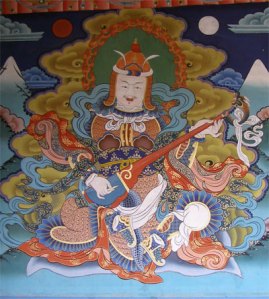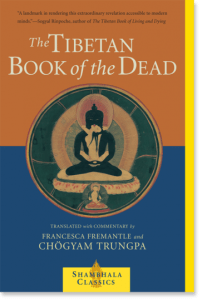Detachment, or nonattachment, can easily be seen in a negative light as indifference, and yet when understood in a certain way is absolutely fundamental to spiritual practice.

Tantra is described as giving both liberation and enjoyment, and constantly emphasises the blissful aspect of enlightenment; it is one of the many paradoxes of the spiritual path that the greatest enjoyment comes through detachment. Tantra teaches us to enjoy consciously, to enjoy with awareness, but awareness itself simultaneously causes and is the result of a subtle movement of detachment. This is not an external distancing of oneself from life or from people, but an inner separation from the lower, limited self, with its false perceptions of the external world. Ordinarily we identify completely with this little self, it lives our lives for us, and we experience everything through it, but at the same time it produces a sense of limitation and bondage, of being controlled by our reactions instead of being in charge of them. Whenever we catch sight of this mechanism in operation, and become aware of it as a direct experience, immediately there is a feeling of opening out, a sense of space in which we have room to stand back and see what is really happening. We experience a new and quite different kind of presence, an ‘I’ who is less personal, less involved, and who can observe calmly the unnecessary problems the little self creates.
When we are happy we usually do not want to hear anything about detachment, because the little self likes being involved in pleasant experiences and thinks it would spoil the fun. Yet flashes of awareness can often occur spontaneously through emotions of happiness, wonder or love. Joy opens the heart and elevates the mind. There is a sudden feeling of expansion; it is no longer just our own personal joy, but it becomes part of the wider awareness of the impersonal presence.
Of course, we can appreciate the value of detachment when we are in the grip of an unpleasant emotion, such as anger, jealousy or unfulfilled desire, or if we are in physical pain. We may desperately want to separate our consciousness from the pain, but the harder we try the more impossible it seems. It is as though the struggle to escape pulls the knots that tie us even tighter. In fact, according to Tantra, we should do the opposite — relax and let go. The mind becomes frightened and thinks it will feel more pain, but, on the contrary, relaxation brings openness, and in the space that is created detachment happens naturally.

There are many accounts by people who found they were able to separate their minds completely from sudden intense pain, fear or grief, sometimes to their own astonishment, as they had never imagined such a thing was possible. But it is best to practise detachment under less stressful conditions, perhaps while doing boring or unpleasant jobs, or waiting for a bus, or when we feel annoyed by disagreeable things like mosquitoes. Detachment is really the same thing as inner stillness, inner peace, no matter what is happening around one or what action one has to perform. Genuine nonattachment is a state which transcends both grasping and rejection, but transcendence always produces paradoxes which are extremely difficult for the logical mind to accept. So we have to practise and experiment patiently in order to build up confidence that it really does work.
The path of Tantra is said to be appropriate for people of strong passions, and it teaches us to experience every kind of emotion fully and completely. Emotions are forms of energy, and we need this energy for our spiritual life, for greater consciousness. Detachment should not be a dilution of energy, but a means of redirecting it to its proper use. If we try to ignore or suppress an emotion, or to make ourselves indifferent, we are actually deadening a part of ourselves and depriving ourselves of a source of energy. But what we often think of as intense emotion is usually really extreme entanglement in emotion. We say we ‘lose control’, we ‘can’t help getting angry’, ‘fall helplessly in love’, and so on. But if a flash of awareness comes, we feel a sudden release from that entanglement, and the emotion takes on an abstract quality of pure, neutral energy. Whatever the original impulse may have been, this experience brings a tremendous sense of joy and freedom; it is like dancing in empty space.
Tantra says that the starting-point, the path and the goal are one. So any practice (the path) can never be separated from the goal of increased consciousness and bliss. This motivation is all-important, especially in connection with nonattachment. There must never be a negative rejection, but a positive making-way for something greater. We are taught to experiment with sensations and reactions, but it must always be done with joy and awareness. If we give up something we like or do something we dislike, it is in order to understand the subjective, relative nature of attachment and revulsion, and to experience their true essence, the ‘one taste’ of spiritual bliss. And whatever pleasures we enjoy, we should try to realise that they are not for the benefit of the lower self, but are offerings to the divine buddha-nature, which is both the enjoyer and the object of enjoyment.
First published in the December 1990 issue of Buddhism Now

Francesca Fremantle received her doctorate from the School of Oriental and African Studies at London University for a study of the Guhyasamaja Tantra. She is a scholar and translator of Sanskrit and Tibetan works and was a student of Chögyam Trungpa for many years. Her books include:


Categories: Buddhism, Buddhist, Buddhist meditation, Francesca Fremantle, Mahayana, Tibetan

Great Francesca real disciple of the Great Trungpa Rinpoche.
What a marvelous post this is! It’s my first encounter with Francesca Fremantle’s teachings and I’m very impressed. I’ve received only one empowerment, but it’s given me more than enough to work with and towards. Thank you for an expansive and wise blog; I enjoy it greatly! _()_
I think this is certainly a post well worthy of note.